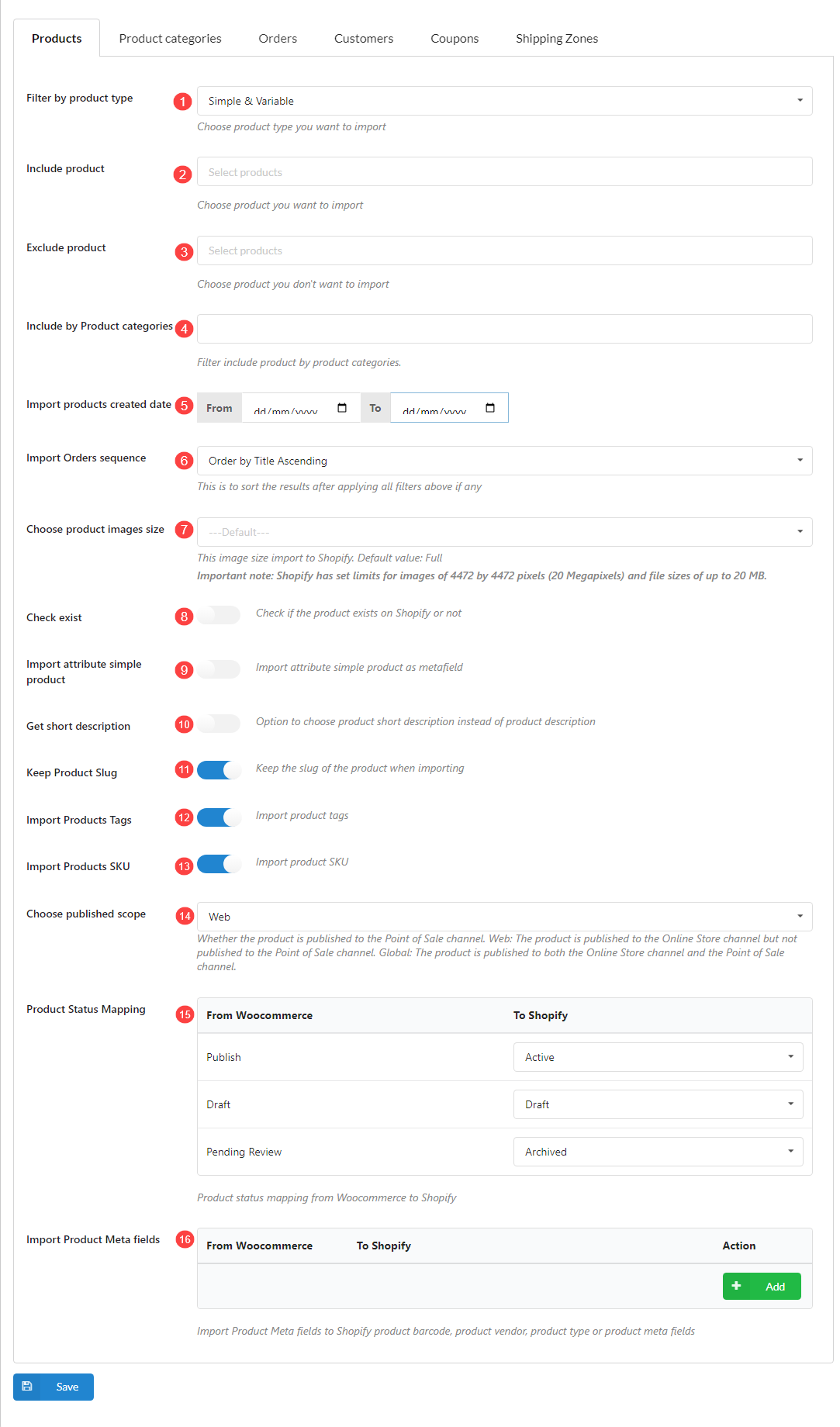In each store setting, you’ll find the tab for each part you want to migrate data, configure all the options here. Starting from Products settings.
1. Filter by product type: This filter allows you to select a product type to migrate, they can be:
- Simple & variable: Migrate all simple and variable products from WooCommerce to Shopify.
- Only Simple: Only migrate simple products from WooCommerce to Shopify.
- Only variable: Only migrate variable products from WooCommerce to Shopify.
2. Include product: Just migrate the products that you enter here.
3. Exclude product: The Migrate WooCommerce to Shopify plugin will migrate all products except the products that you enter in the exclude product field.
4. Include product by categories: Simply migrate the categories in which you enter their title here.
5. Import product created date: Simply migrate the products created during the date range.
6. Import product sequence: Choose the sequence for imported products. There are 6 options to select:
- Title Ascending,
- Title Descending,
- Created Date Ascending,
- Created Date Descending,
- Updated Date Ascending,
- Updated Date Descending
7. Choose product images size: When importing image sizes into Shopify, you can select different options, with the default value set to “Full.”
- 1536×1536 (1536×1536)
- 2048×2048 (2048×2048)
- woocommerce_thumbnail (324×324)
- woocommerce_single (416×0)
- woocommerce_gallery_thumbnail (100×100)
- thumbnail (150×150)
- medium (300×300)
- medium_large (768×0)
- large (1024×1024)
8. Check exist: By default, this option is disabled -> And the plugin will ignore previously imported products. Enable this option to double-check all products before importing. The plugin will scan all products in Woo (including those previously imported) and check if the product entered in Shopify is still on Shopify, if not, the product will be re-imported to Shopify.
Note: Enabling this option will slow down the migration process speed.
9. Import attribute simple product: Import attribute of simple product as metafield
- Namespace: Namespace when importing attributes simple products as metafields. It is a container for a group of metafields. Grouping metafields within a namespace prevents your metafields from conflicting with other metafields with the same key name. Must have between 3-255 characters
10. Get short description: Enable this option to import a product short description instead of a description
11. Keep product slug: The product slug after migrating to Shopify will remain, the same as in your WooCommerce store. If this option is turned off, WooCommerce will automatically generate a product slug from the product name.
12. Import product tags: Enable to migrate all WooCommerce product tags of the product to Shopify
13. Import product SKU: Enable to import of the SKU of all WooCommerce products to Shopify.
14. Check Point of Sale channel: Choose the Point of Sale channel in Shopify
15. Product status mapping: Map the WooCommerce product status to the corresponding Shopify product status. WooCommerce products when imported to Shopify, their status will be the selected status in the “To Shopify” column.
- Active: Keep imported products in the active status in Shopify.
- Archived: Keep imported products in the archived status in Shopify.
- Draft: Keep imported products in the draft status in Shopify.
- Not import: Keep imported products Not import status in Shopify.
16. Import Product Meta fields: Import the WooCommerce product meta fields. You can view how to Import Metadata (Case study) here.
- In the “From WooCommerce” column, add the WooCommerce product meta key
- In the “To Shopify” column, select the corresponding position to import the meta key.
- Product vendor, product type, product barcode: WooCommerce imported meta fields will go to: Vendor; Custom type; and Barcode fields in Shopify.
- Product meta fields: When you import WooCommerce product meta fields to Shopify product meta fields, you must also select the type, and enter the post meta key. With the values imported in this field, you must need a 3rd app to view them.
